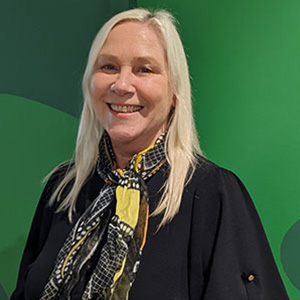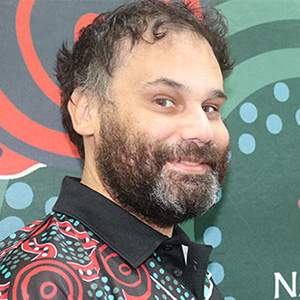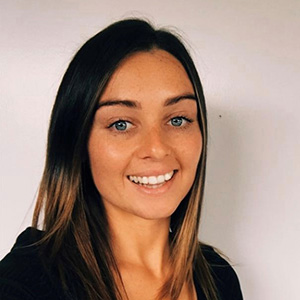Meet some of our Aboriginal staff members who play an integral role in connecting the Agency for Clinical Innovation (ACI) with the community.
Catherine, David and Jessica share what they most enjoy about their role and the important work they do at the ACI to improve Aboriginal health outcomes.
Meet Catherine Kostovski

"My name is Catherine Kostovski (or people often just called me Cathy). I am a Wandi Wandandian, Wodi Wodi and Jerrinja woman from the Yuin nation. I am living on the lands of the Dharawal people. I work as a Project Officer in the ACI’s Aboriginal Chronic Care for Aboriginal People (CCAP) team. I have just secured the role permanently after a two-year secondment from Illawarra Shoalhaven Local Health District.
"If we are going to make a difference in closing the gap and build meaningful sustainable initiatives in our work, we need to increase the Aboriginal workforce."
What do you enjoy most about your role at the ACI and working in the health sector?
When you first come to work at the ACI, you feel this instant connection with the people and place, and you simply don’t want to leave. That’s been the experience for me. There is a welcoming and supportive environment of passionate, dedicated and hard-working people who have the same social justice values as mine, and that’s certainly been comforting for me.
I have really enjoyed the opportunities to grow and learn (even at my age) and work across the multidisciplinary teams. In my role, I work collaboratively with ACI clinical networks, key stakeholders and consumers developing and implementing programs, frameworks and models of care for Aboriginal people and communities. The health system is complex and even more difficult and challenging for mob to navigate. If we are going to make a difference in closing the gap, and build meaningful sustainable initiatives in our work, we need to increase the Aboriginal workforce; connect and link services to form and improve partnerships; and include Aboriginal peoples' voices in all stages of the consultation process.
Tell us about a project you have worked on that has had a positive impact on improving Aboriginal health, and why it's important to you?
I was responsible for leading phase two of the 8 Aboriginal Ways of Learning (8 Ways) project.
We know that patient education and health literacy are cornerstones of good patient care; yet they rely on ways of knowing, being and doing that are fundamentally different from Indigenist and Western perspectives. Our team thought that bringing 8 Ways into a health context would facilitate innovation in health programs and enhance engagement with health services and literacy for Aboriginal people and communities.
8 Ways is all about relational responsiveness. It’s a protocol of attending to relational obligations to the field you are working in; relating and responding holistically to people, land, culture, language, spirit; and the relationships between these with integrity and intellectual rigour.
The 8 Ways methods are used as a supporting framework to guide learning and understanding about Aboriginal peoples and cultures; and develop staff skills, values and critical reflection to bring positive change to professional practice.
One example of a successful 8 Ways project that I am involved in is the shared decision making model Finding your way. It has been a really rewarding and collaborative project where I have been a cultural navigator, connecting and aligning the 8 Ways methods to the core components of shared decision making processes. This work included leading the development of the clinician and consumer videos that will form part of an education package. You can read more about the project in this issue of Clinician Connect.
The 8 Ways training has provided an important foundation for a deeper awareness of Aboriginal culture and protocols, and how this relates to developing culturally appropriate health programs and resources.
Meet David Follent

"My name is David Follent. I am a proud Bundjalung man, living on The Gadigal Lands of the Eora Nation. I am the Senior Project Officer within the Aboriginal Chronic Care Team at the ACI.
"What stands-out the most for [key projects I am working on] is the strong and passionate non-Indigenous colleagues who are on a journey into Aboriginal health with me."
What do you enjoy most about your role at the ACI and across the health system?
The ACI has provided me the opportunity to bring Indigenous thinking to the broad work it does. This has created an inviting environment to allow me to engage, grow my networks and bring innovative thinking into the work I do.
Tell us about a project you have worked on that has had a positive impact on improving Aboriginal health, and why it's important to you?
I am proud of the work I have been involved in across the ACI. There are a few projects I could name; however, the two bodies of work I want to talk about are our shared decision making project Finding your way, a collaboration across the ACI, and My rehab, my journey – Gadjigadji.
What stands-out the most for both projects is the strong and passionate non-Indigenous colleagues who are on a journey into Aboriginal health with me. We are walking together to improve healthcare and health outcomes for the mob.
What's something you've been involved in internally that's helped better inform staff about Aboriginal culture and ways of working?
There are two things I would like to highlight here. First, the work of the Aboriginal Cultural Competency Advocates, which is a group of passionate staff (both Aboriginal and non-Indigenous) who are driving positive change across the organisation. The second is going through a collective journey through using the 8 Aboriginal Ways of Learning project and travelling with ACI staff through, not only a professional journey, but a profoundly personal one.
If you could have a yarn with someone, who would it be and why?
I’m fortunate enough to have very strong family, mentors and colleagues with a lot of collective experience and wisdom in Aboriginal health.
I am also very lucky to have a mother, who has more than 32 years working in Aboriginal health, to offer sage advice accompanied with a trademark quick-witted humour.
Meet Jessica Smith

"My name is Jessica Smith and I am a proud Wiradjuri woman, living and working on Wiradjuri Country near Gundagai. I am the Aboriginal and Cultural Diversity Engagement Officer at the ACI.
"I want to ensure the voices and perspectives of our people are heard and included in our work at the ACI."
What do you enjoy most about your role at the ACI and across the health system?
The variety of projects and initiatives I get to be involved in, allowing me to bring the voices of community into my work. I am passionate about improving the healthcare experience for Aboriginal people and am grateful to contribute to this.
Is there a health project you have been involved in that stands out as having a significant positive impact on the health of Aboriginal communities?
One of the recent projects I have been a part of is undertaking consultation with Aboriginal community members on the ACI's Strategic Plan. Having the chance to sit and yarn with community is important to me. I want to ensure the voices and perspectives of our people are heard and included in our work at the ACI.
What's something you've been involved in internally that's helped better inform staff about Aboriginal culture and ways of working?
I have recently become the co-chair of the ACI’s Aboriginal Cultural Competency Advocates (ACCA) group. ACCA does an amazing job at sharing knowledge and providing guidance around working with our mob. I am extremely grateful to be a part of a passionate group of people, committed to improving cultural responsiveness at the ACI.
If you could have a yarn with someone, who would it be and why?
There are so many people that come to mind. One person is Doctor Miriam Rose Ungunmerr Baumann. A respected Elder, activist, artist and educator who has dedicated her life to supporting Aboriginal children and young people to walk in two worlds through art, culture education and opportunity. I am inspired by her passion and dedication to sharing the concept of “Dadirri” to the world. I would love to sit on Country and yarn with her.